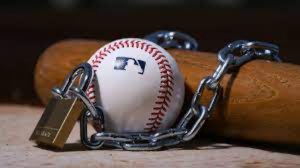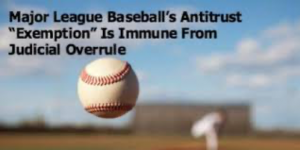 While the nickname “America’s Pastime” may be wearing out, the sport’s popularity may not be its biggest concern.
While the nickname “America’s Pastime” may be wearing out, the sport’s popularity may not be its biggest concern.
Over 100 years ago, the Supreme Court made a ruling that protected baseball from its competition. This decision stemmed from controversy in the early 1900’s when a third major baseball league, the Federal League, was trying to establish itself in unison with the American and National leagues. The goal of this league was to pull players and coaches from the two established leagues to form more competition. However, this did not sit well with the owners of the American and National leagues. These owners drafted contracts with their players binding them to their perspective teams for the rest of their baseball careers.
However, the Federal League has not picked up any steam. This led to the Federal League’s decision to sue the American and National leagues in violation of antitrust law, under the Sherman Act. The Federal League’s main argument was that players could not seek new teams, that owners had agreed not to interrogate other team’s players, and players were not allowed to gain leverage for higher paying contracts.
The lawsuit did not stand up in court and ironically the judge who made the ruling was hired four years later to be the first baseball commissioner. After the 2021 season, the MLB’s Collective Bargaining Agreement (“CBA”) had expired. The CBA is an agreement between the MLB’s Players Association and the MLB which describes the rules of employment and financial structure of the game. At this time, the players and owners were to agree on a new CBA before the 2022 season could begin. Unfortunately, both sides could not reach an agreement and Rob Manfred, the Commissioner of Major League Baseball, was forced to implement a lockout.
During this lockout politicians began to voice their opinion on the MLB’s exemption from antitrust laws. Illinois Democratic Senator, Richard J. Durbin stated that it has been over 100 years since the Supreme Court ruling that first exempted professional baseball from the nation’s laws to prevent businesses from getting together to reduce economic competition. Senator Durbin proclaimed during the lockout that it would be a perfect time to revisit this issue. In addition, Republican Representative Jeff Duncan said in 2021 that he plans on proposing a bill to remove Major League Baseball’s antitrust law exemption in response to the MLB pulling its All-Star Weekend out of Atlanta due to political reasons.
 There is much to be said about the MLB’s exemption from antitrust law. This is only the beginning, and it seems this exemption will be addressed again in the near future. America’s Pastime is turning into a thing of the past. While the 2021-2022 lockout has come to an end and a new CBA has been enacted, this exemption must be addressed, or we may continue to see these types of lockouts. For now, let’s celebrate the 2022 season – let’s play ball!
There is much to be said about the MLB’s exemption from antitrust law. This is only the beginning, and it seems this exemption will be addressed again in the near future. America’s Pastime is turning into a thing of the past. While the 2021-2022 lockout has come to an end and a new CBA has been enacted, this exemption must be addressed, or we may continue to see these types of lockouts. For now, let’s celebrate the 2022 season – let’s play ball!



 While the nickname “America’s Pastime” may be wearing out, the sport’s popularity may not be its biggest concern.
While the nickname “America’s Pastime” may be wearing out, the sport’s popularity may not be its biggest concern.
 There is much to be said about the MLB’s exemption from
There is much to be said about the MLB’s exemption from